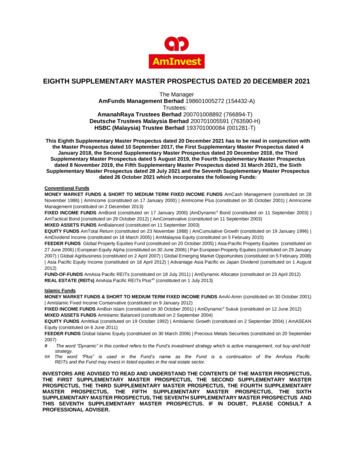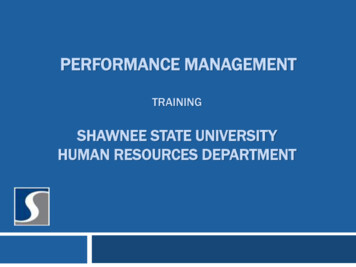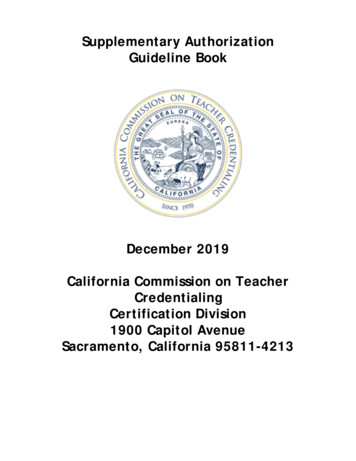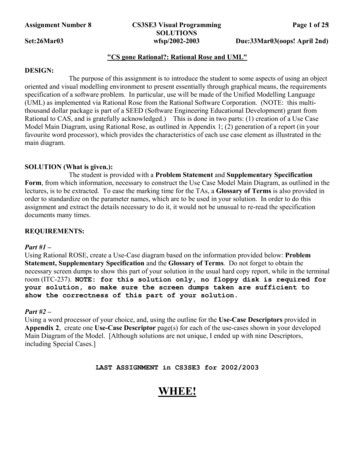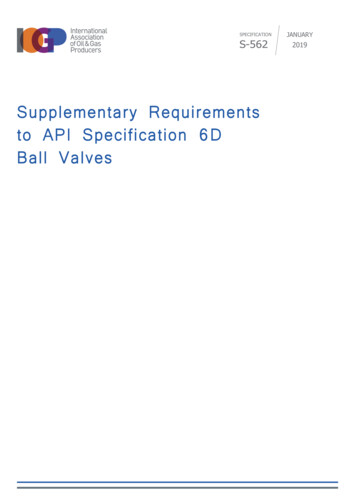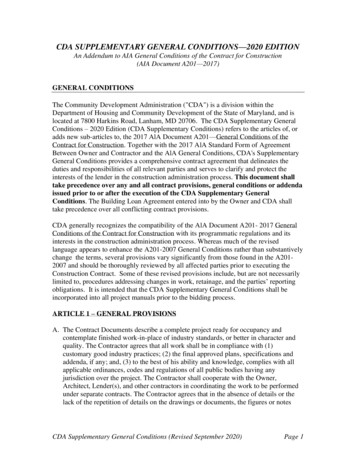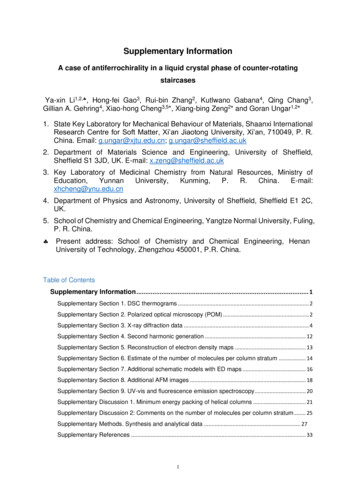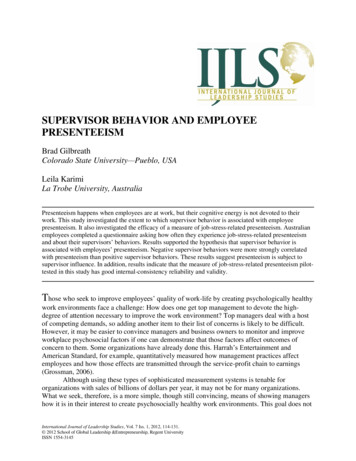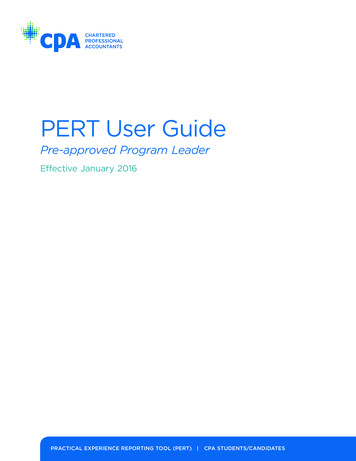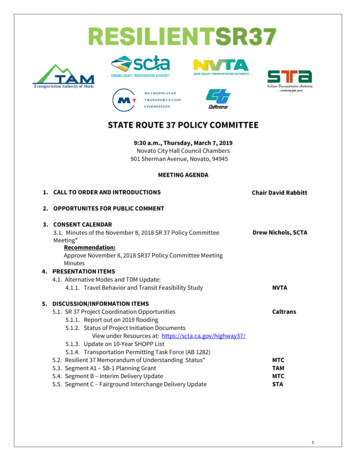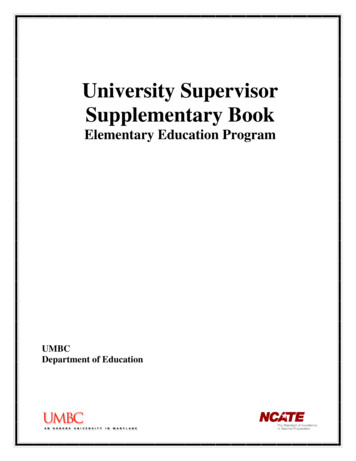
Transcription
University SupervisorSupplementary BookElementary Education ProgramUMBCDepartment of Education
CONTENTI.UMBC PDS NETWORK SITES . 1Elementary Education Program .1Important Contact Information .1II. INTRODUCTION TO SUPERVISING . ERROR! BOOKMARK NOT DEFINED.A. The Goals of the Supervisor. Error! Bookmark not defined.B. Roles of the Supervisor . Error! Bookmark not defined.III.ASSESSING TEACHING AND LEARNING . 41. Clinical Practice Performance Assessment (CPPA) .42. Narrative Statement .43. Evaluation of UMBC Teacher Education Program .5V. PREFERRED ELEMENTARY EDUCATION INTERNSHIP TIMELINE . 6Phase I .6Phase II Single Rotation.7Phase II Split Rotation .8VI. CLINICAL PRACTICE PERFORMANCE ASSESSMENT (CPPA)REQUIREMENTS AND TIMELINE. 9The UMBC Department of Education mission is to research teaching and learning, and to develop caring, thoughtful,knowledgeable, and skilled teachers who are responsive to children, families and the community. We expect our graduates to beleaders in their schools as well as advocates for democracy and social justice.
I.UMBC PDS NETWORK SITESElementary Education ProgramAnne Arundel County Public SchoolsVan Bokkelen Elementary SchoolBaltimore City Public SchoolsVioletville Elementary/Middle SchoolBaltimore County Public SchoolsDogwood Elementary School – on hiatusHalethorpe Elementary SchoolRelay Elementary SchoolRiverview Elementary SchoolHoward County Public SchoolsGuilford Elementary SchoolLaurel Woods Elementary SchoolTalbott Springs Elementary SchoolThunder Hill Elementary SchoolImportant Contact InformationOffice of Field Experiences & Clinical PracticeDirector: Dr. Pamela Morgan, pwmorgan1@umbc.eduPlacement Specialist: Ms. Debbie Bell, dbell5@umbc.eduFaculty Research Assistant: Ms. Yeji Yoon, yyoon1@umbc.eduElementary Education ProgramProgram Director: Prof. Barbara Bourne, barbara.bourne@umbc.eduTk20Assessment Coordinator: Mr. Justin Schaffer, education@umbc.eduElementary Education Program University Supervisor Supplementary Book1
II.INTRODUCTION TO SUPERVISINGThe Supervisor is an important member of the internship team for each Secondary intern. As anofficial UMBC representative to the internship process, the Supervisor actively participates inthe instructional experience of each intern while also coordinating the intern's experience withhis/her mentor teachers. Those associated immediately with the internship include thesupervisor, the mentor and the intern. The larger UMBC team includes the Secondary ProgramsCoordinator, the Director of the Office of Clinical Practice and Field Experiences, the SecondaryPlacement Specialist, the methods instructor, the internship seminar instructor, the EducationDepartment's administrative leadership and graduate assistants who provide administrativesupport.The Goals of the Supervisor Impart professional direction, advice and coaching that enables the intern to develop intoan effective, competent, and qualified Secondary teacher Evaluate the effectiveness of the intern as a Secondary teacher with objectivity, reliabilityand validity in accordance with Educational Department practice. Facilitate the development of a strong, quality relationship between the mentor and theintern.Roles & ResponsibilitiesUMBC SUPERVISOR (UMBC employee) – Observes and supports the professionaldevelopment of the intern and provides feedback on performance; performs the following duties: Conducts observations of and guides interns; provides constructive feedback to interns;provides assessment evidence of interns’ progress in collaboration with ProgramCoordinator, mentors, and as appropriate, school administrators Implements a clinical supervision model that includes three-way pre- and postobservation conferences involving the intern and mentor teacher Guides the gradual induction of interns into the instructional setting and program, startingwith intern observing and directing classroom routines; coaches intern through the stagesof the Andrew’s Model of Gradual Induction:1. Bit Teaching (planning/teaching/assessing small group lessons)2. Initial Teaching (planning/teaching/assessing at least one lesson for a largegroup)3. Sustained Teaching (planning/teaching/assessing sequential lessons – at least 2consecutive lessons or a half day of instruction during the course of the schoolday)4. Full Teaching (assuming the entire classroom instructional schedule – at mentorteacher’s discretion in consultation with the University supervisor and the internfor a minimum of six weeks during Phase II) Conducts an informal observation at the beginning of Phase I for diagnostic purposesonly—no CPPA is completed in the Education Accountability System via TK20Elementary Education Program University Supervisor Supplementary Book2
Conducts two formal observations during Phase I for which a formative CPPA iscompleted for each formal observation (formative CPPA 1 and 2) in consultation with thementor teacher as well as the intern Communicates with mentor teacher and PDS team members to optimize support of intern Contributes to the on-going and final evaluation of the intern, completing ClinicalPractice Performance Assessment (CPPA) forms in the Education Accountability Systemvia TK20 as scheduled (se revised timeline); completes the UMBC Supervisor Feedbackon UMBC Teacher Education Program and Mentor Teacher survey in each intern’s Tk20field experience key assessment file Consults with mentor on various aspects of the internship Alerts Program Coordinator of any observations that are less than proficient or otherissues that jeopardize a successful outcome to the internship experience (ex. attendance,professionalism) Attends conferences with intern, and mentor, and Program Coordinator or other meetingsscheduled by the Program Coordinator, to assess intern progress (e.g. recommendationfor continuation to Phase II) Participates in periodic professional development sessions at UMBC to maintain anddevelop skills in mentoring, supervision, and assessment (ex. CPPA, SPAs, Tk20) Scores the TeachingFolio of assigned interns Attends intern orientation, action research presentation, and celebrationElementary Education Program University Supervisor Supplementary Book3
III.ASSESSING TEACHING AND LEARNINGThree instruments are used by the Education Department to assess the internship experience1. The Clinical Practice Performance Assessment Instrument or CPPA is used to assess theintern's teaching. It is used by the supervisor, mentor and intern.2. A Narrative Statement on the intern's teaching prowess is written by the supervisor andthe mentor.3. The mentor teachers are asked to evaluate UMBC's internship process.Clinical Practice Performance Assessment (CPPA)The CPPA should be submitted to the Education Department through the computer programknown as Tk20. Departmental MA students purchase their Tk20 accounts when they enter theirprograms. Tk20 accounts are created without charge for supervisors and mentors when they arecontracted to work for the department. Paper versions of CPPAs are available, but submissionthrough Tk20 is preferred.The process for a typical observation and evaluation follows these steps: The supervisor and/or mentor share their understanding of the competencies listed in theCPPA with the intern and establish the time for the lesson that will be evaluated.During Phase I, the supervisor is the only member of the team who will evaluate theintern's teaching. During Phase II, when the supervisor, mentor and intern all evaluatethe intern's teaching, it is advisable that all evaluate the same lesson, each using the samecriteria outlined in the CPPA.In a follow-up conference, the supervisor, mentor and intern compare their ratings anddiscuss the intern's areas of strength and areas that need further work. When thesupervisor and the mentor are not able to evaluate the same lesson, evaluations can bemade of different lessons, but the supervisor needs to insure that the observations aremade in a timely manner.After the supervisor has made the 6th and final formal evaluation he/she completes asummative evaluation using the same CPPA form. This evaluation is not based on aspecific observation, but reflects the supervisor's overall assessment of the intern'steaching abilities.Narrative StatementThe narrative statements from the supervisor and mentors are often sought by intern'sprospective employers. Therefore, it is important that they are accurate, and truly reflect theintern's teaching prowess. It is recommended that major topics included on the CPPA areaddressed in the narrative. Supervisor's narratives should be written on UMBC letterhead.Mentor's narratives should be put on school or system letterhead. The narratives should bealigned with and expand on the competencies listed in the CPPA. They should cite anydispositions or qualities of the intern that are not covered by the CPPA. They should mentionany special activities or projects in which the intern engaged that might be of interest to apotential employer.Elementary Education Program University Supervisor Supplementary Book4
The following format should be followed in preparing the narratives:Intern’s NameSupervisor's Name or Mentor’s NameUMBC or the School Name and School SystemSubject Area, and Grade, and English proficiency levelPlacement Beginning and Ending DatesIt is advisable to share the narrative content with the intern.The narrative can be submitted through TK20, collected by the supervisor, or given to the internin a sealed envelope to be submitted to the Phase II internship seminar instructor.Evaluation of UMBC Teacher Education ProgramForms for evaluation of the internship process are provided by the Education Department and areavailable through Tk20.Elementary Education Program University Supervisor Supplementary Book5
IV.PREFERRED ELEMENTARY EDUCATION INTERNSHIPTIMELINE1Phase I Single Rotation: minimum of 20 daysWeek 1Observe routinesGet to know classAssist as neededWeek 2Take over some routinesAssist as neededWeek 3 - 4Continue to take over routinesCo-plan with mentor/teamWork with small groupAssist as neededWeek 5Continue to take over routinesCo-plan with mentor/teamWork with small groupPlan and teach whole group lesson in content or a subject areaWeek 6-9Continue to take over routinesCo-plan with mentor/teamWork with small groupPlan and teach whole group lesson in content or a subject area - try new subject each week or soWeek 10-13Continue to take over routinesCo-plan with mentor/teamCo-plan and work with small group in reading and mathPlan and teach whole group lesson in content or a subject area – try a new subject each week or soWeek 14-17By this time, the intern should be comfortable planning and teaching all subject areas.Continue to plan and teach as much as possible and begin to transition back to the teacher.Week 18-20By this point the intern should have taught all subject areas and is continuing to transition back tothe teacher.Note: This is a suggested timeline. Mentors and interns should adapt this to create their ownplan for intern to gradually assume responsibility and complete two weeks of full teaching.1This timeline should be implemented as developmentally appropriate for the intern, but with the understanding thatonly interns who demonstrate proficiency in being able to lead and manage a classroom effectively will berecommended by UMBC for certification by the Maryland State Department of Education (MSDE).Elementary Education Program University Supervisor Supplementary Book6
Phase II Single Rotation minimum of 80 days5 formal observations with supervisor – 6 weeks of full teachingWeek 1:Observe routines/resume responsibility for routines from Phase IWeek 2-3: Bit TeachingTake responsibility for all routinesCo-teach whole group lessonsWork with small groupCo-plan for all subjects and one content2Week 4-5: Initial TeachingPlan and teach one subject or one contentWork with small groupsAssist in all other subjectsCo-plan for all subjects and one contentWeek 6-7: Sustained TeachingPlan and teach one subject and one contentCo-plan for all subjects and one contentWeek 8-9: Sustained TeachingPlan and teach two (2) subjects and one contentCo-plan for all subjects and one contentWeek 10-11: Sustained TeachingPlan and teach three (3) subjects and one contentCo-plan, co-teach and assess all subjects and one contentWeek 12-13: Full TeachingFull-time teaching should begin here, depending upon where the intern is in the induction processLead planning, teaching, and assessing all subjects and one content; conduct all routinesWeek 14-15: Full TeachingLead planning, teaching, and assessing all subjects and one content; conduct all routinesWeek 16-17: Full TeachingLead planning, teaching, and assessing all subjects and one content; conduct all routinesBegin transitioning classroom back to mentor teacherWeek 18:Complete transitioning classroom back to mentor teacher2Content refers to social studies, science, and health.Elementary Education Program University Supervisor Supplementary Book7
Phase II Split Rotation minimum of 80 days5/6 formal observations with supervisor – 2 -3 weeks of full teaching during each rotationWeek 1: Observing/routines/bit teachingObserve routines/resume responsibility for routines from Phase IWork with small groupCo-plan for all subjects and one contentWeek 2: Bit TeachingTake responsibility for all routinesCo-plan for all subjects and one contentContinue to work with small groupsCo-teach whole group lessonsWeek 3: Initial TeachingPlan and teach contentWork with small groupsAssist in all other subjectsCo-plan for all subjects and one contentWeek 4: Sustained TeachingPlan and teach (1) subject and one content (math should be first subject to be taught)Co-plan for all subjects and one contentWork with small groups and assist all subjectsWeek 5: Sustained TeachingPlan and teach two (2) subjects (math and language arts) and one contentCo-plan for all subjects and one contentWork with small groups and assist all subjectsWeek 6: Full TeachingPlan and teach three (3) subjects (math, LA, an reading) and one contentCo-plan, co-assess all subjects and one contentWeek 7: Full TeachingBy this time the intern should be teaching all subjectsLead planning, teaching, and assessing all subjects and one content; conduct all routinesWeek 8: Transition back to teacherComplete transitioning classroom back to mentor teacherWeek 9-16: Move to 2nd rotation and begin againThe Andrews Model of Gradual InductionBit Teaching: planning/teaching/assessing small group lessonsInitial Teaching: planning/teaching/assessing at least one lesson/subject for a large groupSustained Teaching: planning/teaching/assessing sequential lessons (at least 2 consecutivelessons or a half day of instruction during the course of the school day/2-3 subjects)Full Teaching: assuming the entire classroom instructional schedule (at mentor teacher’sdiscretion in consultation with the University supervisor and the intern)Elementary Education Program University Supervisor Supplementary Book8
V. CLINICAL PRACTICE PERFORMANCE ASSESSMENT (CPPA) REQUIREMENTS AND TIMELINEELEMENTARY EDUCATION PROGRAMTEACHER CANDIDATEStage ofEvaluation:Phase I ObservationPhase II ObservationSummative Report formative 1 formative 2 summative(Phase I Week 16)(Phase II Week 8)End of Internship (Phase II Week 16)Phase I ObservationPhase II ObservationSummative Report formative 1 formative 2 summative(Phase I Week 16)(Phase II Week 8)End of Internship (Phase II Week 16)MENTOR TEACHERStage ofEvaluation:UNIVERSITY SUPERVISORPhase I ObservationStage ofEvaluation:Phase II ObservationSummative Report formative 1 formative 2 formative 3 formative 4 formative 5 formative 6 summative(Phase I Week 8)(Phase I Week 17)(Phase II Week 4)(Phase II Week 8)(Phase II Week 12)(Phase II Week 14)(Phase II Week 16)Elementary Education Program University Supervisor Supplementary Book9
official UMBC representative to the internship process, the Supervisor actively participates in the instructional experience of each intern while also coordinating the intern's experience with his/her mentor teachers. Those associated immediately with the internship include the supervisor, the mentor and the intern.
